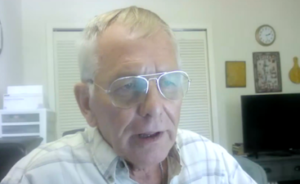During the April Retiree Summit at Bear Mountain, one informative panel was called “The Texas Two-Step,” moderated by Retirees for Justice Executive Director, Edward Stone. The topic was corporate mergers, spinoffs, acquisitions, and their impact on pensioners.
Stone explained that the “Texas Two-Step” is the process of a company creating a subsidiary, either by choice or as compelled by the courts. The company then loads all their “toxic” or unwanted liabilities into that subsidiary, to eventually spinoff and cast that subsidiary off ahead of a likely bankruptcy declaration in the future.
This tactic has been deployed in corporate America for a long time.

For Verizon retirees, think back to the SpinCo in late 2006 when the directory operations business was made into IDEARC Media. Financially burdened from the start, years later it would go through bankruptcy and restructuring, coming out in a rebrand as SuperMedia. Continually burdened, the brand would finally merge to become Dex Media.
These elite corporations shuffled assets and liabilities. Things, intentionally or not, “fell through the cracks” and there was very often a lack of attention focused on what happens to the fate of employees and retirees.
Panelist, Pamela Harrison, BellTel board secretary; Carol Knotts, of the DuPont Retiree Association; and John Phelps, for the GE Retirees Association, shared how such mergers, spinoffs, and acquisitions negatively affected their companies and fellow retirees.
Harrison proudly calls herself a Bell Head as a third-generation phone company employee. She “graduated from high school on a Friday, and on Monday morning I was working for the phone company.”
Harrison’s grandfather’s brother began his career in 1897 with New York Telephone Company and was there for the merger of NY Tel and Rochester Telephone in 1927, rising to become Assistant to the President, and eventually was elected Corporate Secretary in 1927.
So, at the young age of 18, Harrison joined the company and signed on with a salary, benefits, and an iron-clad retirement plan. Harrison said she was told, “Not only will these benefits continue with you through your career, but when you leave, they will follow you for life.”
Unfortunately, she explained, “The benefits I was told I was earning in 1965 are not the benefits I have now.”
Her career at NY Tel, became NYNEX, next Bell Atlantic, and finally Verizon. The biggest change, Harrison said, “Healthcare. I feel like I can’t afford some of the things that I used to be able to.”
Knotts explained that she also joined her company, DuPont, right out of high school. “Everyone [in my town] worked for DuPont practically. It was a family business and they took care of employees. They were known for that.”
She worked at DuPont for 31 years, most of which was in the Teflon and coating division. During her working years, Knotts never thought she had to worry about her healthcare or benefits.

Then DuPont and Dow merged to become one company to create DowDuPont, then quickly split again to create three different companies Dow, DuPont, and Corteva, carving up the assets and liabilities.
Now, Corteva, a company Knotts had never worked for and didn’t exist when she retired, is 100% responsible for her healthcare and retirement of 120,000 retirees. In fact, the first day her benefits shifted from DuPont to Corteva, they cancelled life insurance for the retirees.
“When the company decided to split up into the three entities, I decided to join the retirees association leadership because I was worried about my pension.”
Phelps worked for General Electric for the first 35 years of his career before moving to a successor employer, as a result of his division being sold off.
“I’ve been involved in defending the GE retiree benefits … since 2014 when the salary people filed the lawsuit against GE over their taking away the healthcare and in 2015 when the unions filed a lawsuit on the same issue.”
When GE sold his division, it was acquired by Apollo, the private equity firm that also owns the insurance and annuity firm Athene, a major player in the group pension-annuity sector.
Phelps shared that GE is currently planning to spin off its existing the business into three companies: GE Healthcare, GE Aerospace – formerly GE Aviation, and GE Renewable – formerly GE Power and Renewable Energy.
He said, “When they spin them off, obviously there’s a lot of uncertainty about what’s going to happen to our benefits. Are they going to get worse?”
It’s clear across the board that retirees from many major U.S. corporations are being left out in the cold by the very companies to which they dedicated their lives.
As Carol Knotts sums it up, “No one cares. We are the only people who care, and we have to do something.”
Through all these different company changeovers, was anyone truly looking out for the employee or retiree to make sure their pensions and benefits were protected? It’s a classic example of the importance of advocacy and why BellTel is so deeply committed to this cause.